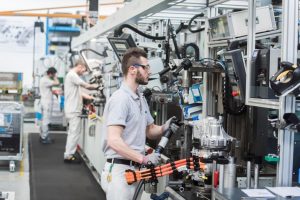West Midlands manufacturers optimistic of future growth prospects – MHA

WEST Midlands manufacturers remain optimistic of their future growth prospects, but are cautious of the impact leaving the EU could have on their expansion plans, a new survey has concluded.
The fifth annual Manufacturing and Engineering survey, which collates responses from more than 550 SME manufacturers and engineers across the UK, has been compiled by MHA, supported by Lloyds Bank Commercial Banking.
It suggests almost three quarters (73%) of firms in the region are positive about their growth prospects in the coming 12 months.
However, a note of realism was struck in relation to concerns over the way Brexit negotiations would go, with 42% of businesses perceiving this uncertainty to be a barrier to growth.
Aside from these, major concerns remain over the skills shortage afflicting the sector and the apparent lack of support for firms following the demise of services such as the Manufacturing Advice Service and Growth Accelerator.
So far as skills are concerned, 42% of firms questioned said they were hoping to recruit over the next 12 months, but the inability to find skilled staff to do the job remained a major problem for almost two thirds (61%) of those businesses.
The overwhelming majority (96%) of West Midlands companies believe their production costs will rise in 2016/17 due to the increasing cost of raw materials together with higher wages.
As a result, productivity gains are being seen as important in bringing down costs, as 60% of firms have said they won’t be passing the additional costs onto their customers.

Andy Moss, Area Director for Manufacturing at Lloyds Bank Commercial Banking in the West Midlands, added: “While the result of the EU Referendum has left manufacturers with some questions over how they will fulfil their future plans, many in the West Midlands are actively identifying new opportunities with global trade partners to help deliver sustainable growth.”
He said closing the skills gap remained crucial to sustaining the long-term success of the industry, and bank was supporting the development of new apprentices at the Lloyds Bank Advanced Manufacturing Training Centre in Coventry..jpg?access=667T442T840)
“Manufacturing has never been more important to the success and growth of the British economy, and continuing to work closely with firms through this evolving economic landscape will ensure they maintain their competitive position in domestic and global marketplaces,” he added.
The main findings of the report are:
• Half of all respondents put skills shortages at the top of their agenda. Most businesses want government to expand skills training for the future work-force in Secondary Schools, Higher and Further Education (FE) colleges.
• 68% of respondents believe their main competitors are UK based and 32% said their main competitors are based within their own region of the UK.
• 47% of respondents expect to increase their staff numbers in 2016 (an increase of 8% from last year), with 57% of companies intending to take on apprentices or trainees.
• Of the respondents that anticipate their staff numbers increasing in the next 12 months, 59% need to recruit production staff. However, 41% indicated that they have trouble recruiting skilled machinists / technicians.
• 18% of businesses reported that recruiting appropriately skilled staff is the main barrier to growth over the next 12 months; this is a decrease of 10% from last year which is encouraging although this may just be a reflection in the shift of concern towards the effects of leaving the EU.
• Where recruitment is a barrier to growth, 31% of respondents favoured adopting lean manufacturing strategies and 23% favoured automation or further automation as a coping strategy. Shift working or flexible working patterns (25%) was also seen as a viable option.
• When asked about the availability of skilled recruits, only 11% had a positive outlook compared with 49% having a negative outlook.
MHA is a UK-wide group of accountancy and business advisory firms.









